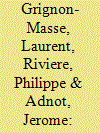| Srl | Item |
| 1 |
ID:
113437


|
|
|
|
|
| Publication |
2012.
|
| Summary/Abstract |
The investigation is an attempt to apply a set of consistent and official definitions of energy services (ES), energy efficiency services (EES) and energy performance contracting (EPC) on a well-developed market: France. After defining the historical context of the French market the authors describe the types of offers that are presently made and that fall within the definition of energy services. There are many classic and novel factors for the success of energy services. For instance, the energy services market is now partly structured by the CEE scheme, the French 'white certificates' or 'energy certificates scheme'. Also the grid problems lead to new services. The companies active on the market are described as a result of an empirical survey of ES market in France. This empirical survey of ES market in France includes estimates of the number of companies and of their turnover both for ES and EES. Examples and case studies are developed as a background.
|
|
|
|
|
|
|
|
|
|
|
|
|
|
|
|
| 2 |
ID:
103347


|
|
|
|
|
| Publication |
2011.
|
| Summary/Abstract |
In Europe, buildings tend to be equipped with individual air conditioners, which constitute a fast growing electrical end-use. In this context, this study aims to assess the environmental impacts of European individual air conditioners and to analyse policy strategies to reduce these impacts. After analysing the European context concerning individual air conditioners, the environmental impacts of European air conditioners are assessed using a Life Cycle Analysis approach. The following step consists in studying, both technically and economically, different improvement options aiming at reducing the environmental impacts of these appliances. These results, obtained at the product level, are then generalised at the European level and different policy measures are defined and analysed. The main conclusion is that the implementation of a Minimum Energy Performance Standard based on Least Life Cycle Costs could save up to 49 TWh and 20 MtCO2-eq in 2020 and be economically beneficial to the European end-user.
|
|
|
|
|
|
|
|
|
|
|
|
|
|
|
|